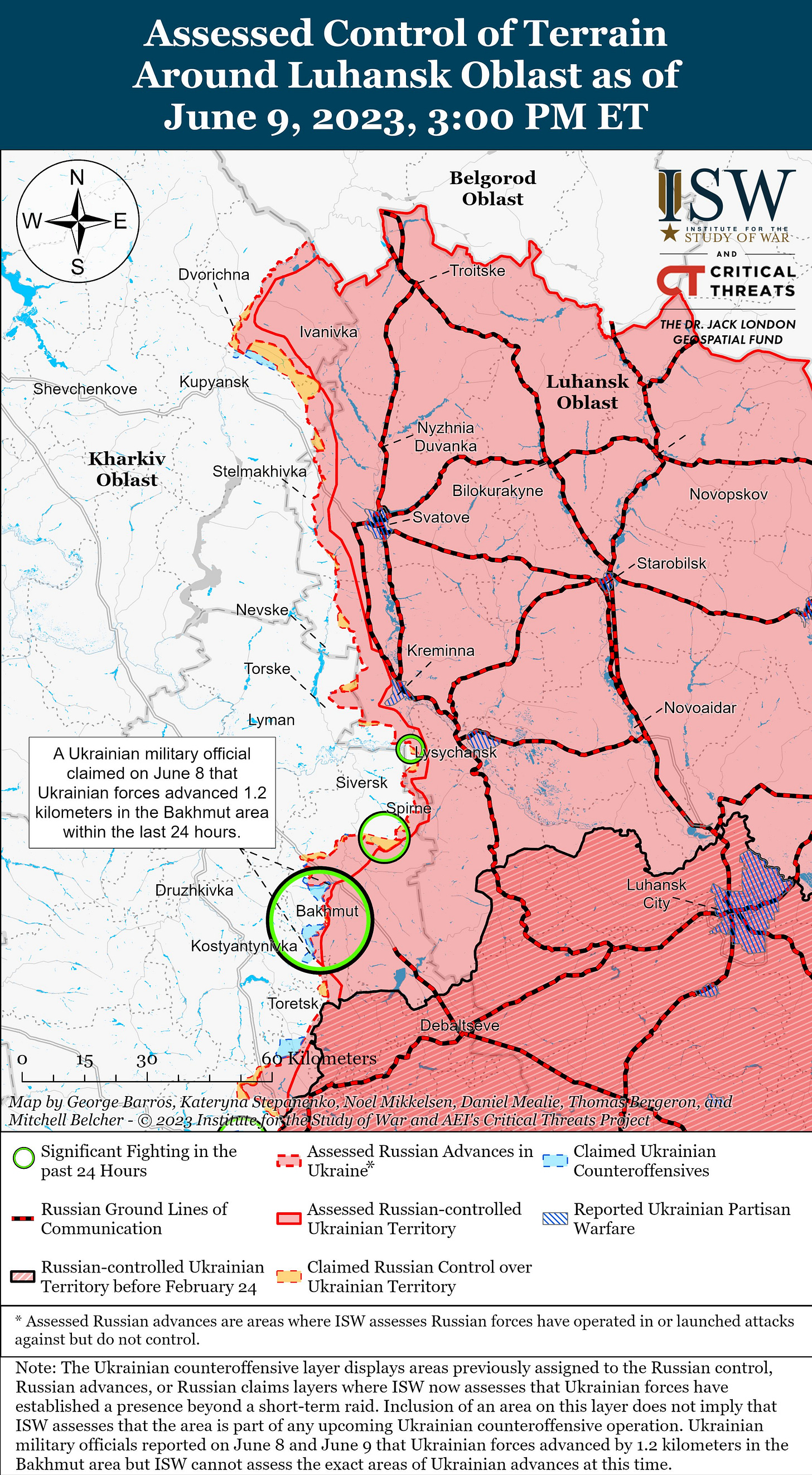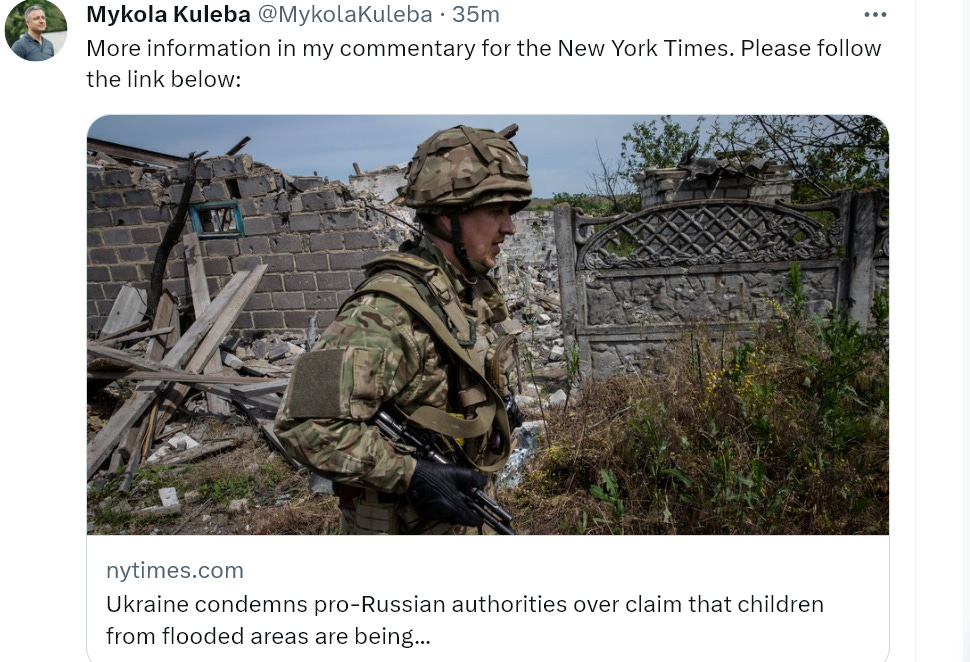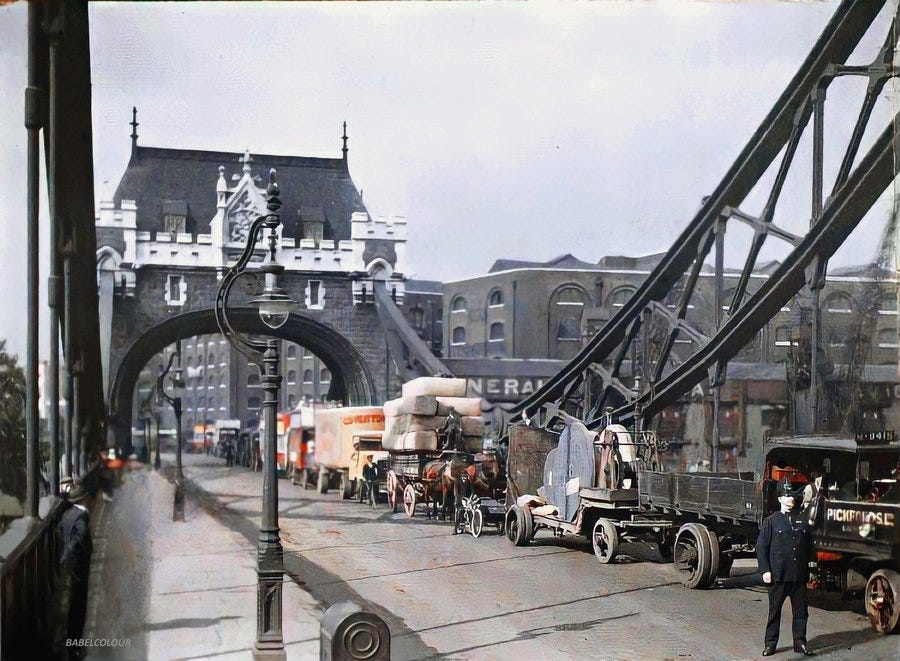Jun 11: Sunday Stories
Day 472: UASitRep RUSitRep Kakhova RUarmyHQs Trudeau Odesa Arabat IAEI China Ufa BEL CFE NL $200M Estonia Iceland NZ A&P Sabbagh UKDef ISW Kuleba Mash Sutton EUCouncil Humphreys BBC AtlanticCouncil
Catching up…
EA Worldview’s Ukraine Up-date- hop over to Scott’s amazing hourly Ukraine up-date page. I’ll fill in with some bits and bobs.
President Zelensky on the inaction of international organisations:
“When international organizations that are supposed to protect life on a global scale do not manage to form and send a rescue mission to the occupied territory even in a week, when some world actors do not dare to come out even with clear and strong statements that would condemn this yet another Russian crime of war, terrorists simply feed on this weakness of the world, this indifference - it encourages them. And this is what we must overcome. And we will overcome."
Stories we’re following…
2 killed in Russian attack on medical facility in Zaporizhzhia Oblast. Russian forces hit a medical facility in Huliaipole, Zaporizhzhia Oblast, with a guided aerial bomb, the regional administration reported on June 9.
A drone attack by Russian forces killed three people and injured 27 people, including three children, in Ukraine’s Odesa oblast region in the early hours of Saturday morning, according to Ukraine’s southern command. Emergency services said but the fire had been rapidly put out and 12 people were rescued from the building.
On the night of June 9, Russia attacked Ukrainian gas production facilities. Two of them sustained damage. On 10 June morning, the Russian military shelled the central part of Avdiivka 12 times, Vitalii Barabash reports.
Ukrainian forces hit Russian army-level HQ: "2 strikes carried out during the night, one in Arabat Spit, the other in Zhelezny Port."
Ukrainian Defense Forces launched offensive operations on at least three sections of the front. They failed to achieve operational surprise in Zaporizhzhia Oblast. A successful attack by Ukrainian Defense Forces on Horlivka and Yasynuvata may lead to the loss of the entire Russian line of defense in the Donetsk direction, Donetsk and Makiivka themselves. In the direction of Bakhmut, the Ukrainian forces have switched from defensive to offensive operations, gaining almost 2km on the flanks around the city.
“We’re trying … to conduct strikes on the enemy, we’re counterattacking. We’ve managed to advance up to 1,400 metres on various sections of the front,” Serhiy Cherevaty, the spokesperson for the eastern military command said when asked about fighting near Bakhmut.
The Russian forces are concentrating their main efforts on the Lyman, Bakhmut, Avdiivka and Maryinka directions. They are also preparing to defend Crimea and making plans to retreat into the depth of the peninsula.
The minefields installed by the engineering units of the 58th Army of the Russian Armed Forces played a crucial role in disrupting the attack of the Ukrainian Defense Forces on the morning of June 8. The effective use of the enemy electronic warfare units and enemy strike aircraft is noted.
EU Commission on Kakhovka dam disaster: Russia bears 'primary responsibility' as it invaded Ukraine, EU Commission spokesperson Dana Spinant said on June 9.
Mykola Kuleba: “The so-called head of the occupied Kherson Region, Volodymyr Saldo, announced plans to "evacuate" children on mandatory bases from flooded villages and relocate them to summer camps within the region or in Crimea.”
Once again, Russians manipulate human tragedy. They deport Ukrainian children under the pretext of ‘rescue,’ separating them from their parents and using them as human shields for human rights abuses.
Children are the most vulnerable during a major catastrophe, such as the flood caused by the explosion of the Kakhovka dam. It is extremely difficult to trace their fate in the flooded territory. [continue to article in The New York Times]
The IAEA announced on June 9 that it is launching a program to assess the integrity of the Zaporizhzhia NPP infrastructure in light of Russia's destruction of the Kakhovka dam. This is crucial to set up an early warning system, which the first step in the crisis management praxis.
Investigation: Belarus sent over 130,000 tons of munitions to Russia in first year of full-scale war. Belarus' government, led by dictator Alexander Lukashenko, gave Russia 131,582 tons of ammunition, according to an investigative project of Belarusian journalist Anton Motolko.
Russian military receives Chinese armored vehicles. Ramzan Kadyrov, the leader of Russia’s Chechnya region, has confirmed that the Russian military has received the first batch of Chinese-made armored vehicles. Kadyrov has released footage showing “new vehicles purchased for Chechen units participating in the Special Military Operation [war in Ukraine].”
10 fuel tanks burning in Ufa, Russia, on June 9, RIA Novosti reported.
Putin announced that tactical nuclear weapons would be delivered to Belarus after July 7-8. Though China agreed that the "further spread of such [nuclear] weapons must be prevented" in the Joint Statement of the Leaders of the Five Nuclear-Weapon States on Preventing Nuclear War and Avoiding Arms Races, particularly, and stated that States should "withdraw nuclear weapons deployed abroad" and insisted on reducing the "role of nuclear weapons in their national security policies" in the Joint Statement of the Russian Federation and the People's Republic of China on the International Relations Entering a New Era and the Global Sustainable Development, so far, Beijing has failed to react on the Russian proliferation of nuclear weapons unfolding in plain sight.
The State Duma Committee on Defense approved a bill that proposes to allow Russians with limited physical fitness and a criminal record to serve in the army under a contract during the period of mobilization and in martial law. Convicted fellons who have committed grave crimes will not be allowed to serve but murderers and thieves have not been excluded. The bill also stipulates that everyone up to 65 years of age can serve, and officers up to seventy.
The head of Chechnya, Ramzan Kadyrov, announced on Telegram that two new regiments had been formed in the republic - Akhmat-Russia and Akhmat-Chechnya.
Nato allies on Friday condemned Russia’s decision to withdraw from the Treaty on Conventional Armed Forces in Europe (CFE). “Russia’s decision to withdraw from the CFE Treaty is the latest in a series of actions that systematically undermines Euro-Atlantic security,” Reuters reports the alliance said in a statement. “Russia’s decision further demonstrates Moscow’s continued disregard for arms control,” it said.
Reuters has a quick snap that Belgium will supply Ukraine with 105mm artillery rounds worth €32.4m (£27.8m/$35m), citing a spokesperson for Belgium’s defence ministry.
A £150m fund to help Ukrainians into their own homes has been announced by the UK government. More than 124,000 people have arrived in the UK under the Homes for Ukraine scheme since Russia invaded Ukraine in February last year.
The Netherlands’ highest court ruled Friday that a priceless collection of Crimean gold must be handed over to Ukraine, the latest move in a legal tug-of-war spanning almost a decade. The treasures, dubbed the “Scythian Gold”, were loaned to the Allard Pierson Museum in Amsterdam just before Moscow annexed Crimea in 2014.
The EU Council has agreed on its general approach towards an E.U. law that will establish criminal offenses and penalties for the breach of E.U. sanctions. This directive, when adopted, will be an important tool to ensure that violating sanctions does not pay off
32 countries join Ukraine's genocide lawsuit against Russia. The majority of the judges at the United Nations' International Court of Justice (ICJ) have authorized the inclusion of 32 countries in Ukraine's genocide lawsuit against Russia, the ICJ announced on June 9.
Canada will be part of a multinational effort to train Ukrainian fighter pilots, Prime Minister Justin Trudeau has said. Trudeau and Deputy Prime Minister, Chrystia Freeland, were on a visit to Kyiv during which Trudeau also announced $500m in new funding for military assistance for Ukraine. Trudeau also said that Canada was seizing a Russian-owned Antonov cargo aircraft that landed in Canada last year and starting the process of forfeiting the aircraft to Ukraine.
Monique: For my family and friends in Canada.
Belgium to provide Ukraine with $35 million worth of ammunition. Belgium’s government has approved supplying Ukraine with 105mm ammunition worth 32.4 million euros ($35 million), Belgian newspaper Het Laatste Nieuws (HLN) reported on June 9.
The European Bank for Reconstruction and Development (EBRD) will provide a €200m (£170m/$215m) loan to Ukrainian state railway company Ukrzaliznytsya to help improve links to the EU, officials said on Friday. The Ukrainian deputy prime minister Oleksandr Kubrakov said he had signed an agreement that would help accelerate the modernisation of railway links and upgrade rolling stock.
Estonia bans Patriarch Kirill, among others, from entering. Kirill was one of 58 Russian citizens banned from entering the Baltic country because Estonian authorities believe they are involved in human rights violations under the renewed use of the Magnitsky Act. Estonian FM Margus Tsahkna called the patriarch:
"the biggest supporter of [Russian President Vladimir] Putin." Tsahkna also noted that Kirill supports the invasion of Ukraine, stressing that people with such a position are “not welcome” in Estonia.
Iceland has announced that from 1 August it will suspend operations of its embassy in Moscow. The country only operates 18 bilateral embassies in foreign capitals. Iceland stated it that it had accordingly asked Russia to lower the level of diplomatic representation at its embassy in Reykjavík., and said in a statement:
This is not an easy decision as Iceland has enjoyed rich relations with the people of Russia since our independence in 1944. However, the current situation simply does not make it viable for the small foreign service of Iceland to operate an embassy in Russia.
New Zealand's only noncommercial, public broadcaster has announced an outside investigation and review of its editing of online stories after what it called "15 instances of inappropriate editing" that pushed a "false account" of the ongoing war in Ukraine.
Indiana Jones weighs in on Trump…
London Bridge…
Via Stuart Humphreys: London's Tower Bridge, 99 years ago this week: I've enhanced this rare autochrome of London, taken in June 1924 by Roger Dumas. The bridge is raise, causing tailbacks in the traffic (which is a wonderful mixture of motorised & equine power). It is original colour, not colourised.
Atlantic Council Experts react: Boris Johnson is resigning. What’s next for the United Kingdom on the world stage?
Boris Johnson announced on Thursday that he would leave his post as prime minister of the United Kingdom as soon as a replacement from within the Conservative Party is selected, after a series of scandals resulted in a revolt from within his administration. So what happens now to the “Global Britain” that Johnson was trying to build? We reached out to our experts to gauge the reaction in foreign capitals to the drama in Westminster, and what the future might hold for the United Kingdom. [continue on to read Peter Westmacott, Frances Burwell, Peter Dickinson]
A monument to failure—Ben Judah is a senior fellow Europe Center.
Boris Johnson once remarked he went into politics because nobody ever built a statue to a journalist. The truth is that nobody in Britain is ever going to build a statue of Boris Johnson, except perhaps in mockery.
He will leave two monuments in British political history: not only an increasingly failing Brexit but also a warning to future prime ministers of how you can personally fritter away an eighty-seat majority. Johnson tried to rule presidentially, even royally—in his desperation talking of his personal mandate—only to underscore that Westminster remains a parliamentary system, in which leaders serve at the pleasure of their MPs.
It may not be a plinth outside Parliament, but despite everything Boris Johnson will leave office with a street named after him in Ukraine. His decision to be “way out in front” of all Western allies on defending Ukraine, from anti-tank weapons to sanctions, made a critical difference in the nation’s defense in the eyes of Ukraine’s most senior officials who, pretty much alone, tweeted their respect and gratitude for his achievements.
A lot of what Johnson did was empower a tough-minded network of foreign-policy advisors and security officials to put Ukraine first. The British senior civil service is not politically appointed so much of this network will stay in place. London without Johnson will not drop Kyiv.
Like on Brexit, he leaves a legacy that his successors simply can’t overturn—the cross-party consensus is deep on backing Ukrainian President Volodymyr Zelenskyy—but again like on Brexit, the question is with what fervor will it be pursued. The next prime minister is unlikely to have Johnson’s appetite for risk, especially on sanctions, as the ailing British economy gets sicker. [continue]












